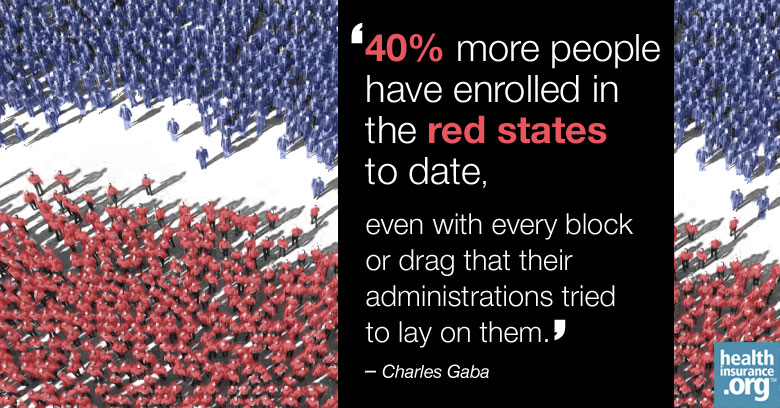
If the Supreme Court rules for the plaintiffs in King v. Burwell, cutting off the federal subsidies for some 7 million people who bought private health insurance through the federal health insurance marketplace established by the Affordable Care Act, what happens next? The law will still be on the books, but the health insurance markets in the 37 states served by HealthCare.gov, the federal exchange, will cease to function if the subsidies stop.
Republicans in Congress insist that they will push for full repeal, but they have no “replace.” The administration will cop to no contingency plans, perhaps not wanting to signal to the Supreme Court justices that there’s a viable alternative to letting the law function in its current form.
A negotiation will of course take place, however, if the Supreme Court drops the King bomb on the ACA. And Michael Leavitt, who sat in Sylvia Burwell’s now-very-hot seat as Secretary of Health and Human Services in the George W. Bush administration, thinks he can discern the outline of that negotiation.
Though he served three terms as governor of Utah, perhaps the nation’s most conservative state, Leavitt views our current healthcare wars through a relatively non-ideological lens. Republicans cast the ACA as a federal encroachment on the states, and Leavitt has sat on both sides of that divide. At HHS, he oversaw the rocky rollout of the Medicare prescription drug benefit – and evinced considerable empathy with the administrators struggling in late 2013 to get the ACA going. He takes pride in having effectively fashioned Utah’s Children’s Health Insurance Program within the constraints set by the federal government.
As CEO of a health consultancy, Leavitt Partners, he came under considerable GOP fire in 2011 for urging Republican governors and legislators to take control of their own state exchanges (an effort his firm stood ready to help) rather than cede the project to the federal government.
I spoke to Leavitt on February 19 about what might happen if the Supreme Court bars the federal exchange from crediting subsidies to ACA customers. An edited transcript follows.
Andrew Sprung: If The Supreme Court upholds King, are there grounds for a compromise that both sides would accept? Why is no one talking so far?
Michael Leavitt: In any political process both sides first posit their position strongly without any possibility for compromise. Step two will begin when the effects of the Supreme Court decision begin to unfold and each party begins to assess their potential gain and damage. Once there’s sufficient pain on both sides, then the sides will come together.
So the question is, are there grand compromises? I suppose there are, but we’re not at the point yet where either party is prepared to talk about it.
What might be acceptable to both sides?
Sprung: What might be acceptable to both sides?
Leavitt: Obviously, the administration is going to point to a simple legislative fix and say, you can save millions of people their health insurance by passing a piece of legislation. That’s a simple and direct argument. Right now the Republicans are still thinking through what their unified response might be – it hasn’t yet emerged. It will need to, because a divided message will fall victim to a single message.
Right now, Republicans are in two camps. One says that this presents an opportunity to deal a fatal blow to Obamacare, and we ought to exploit it in every way possible. The other position is, we’re with you on disliking Obamacare, but you’re underestimating the impact this could have, and it’s also putting us in a bad position politically. We need to find a solution that allows us to gain as much as ground as possible, and not fall victim to the politics of depriving people who are in need.
One way this could begin to reconcile itself would be to for each party to get something they want. Democrats want to keep the progress they have made [reducing the number of uninsured], and if possible to expand it. Republicans have for some time wanted a more market-oriented healthcare distribution structure. They believe the exchanges have been captured as a creature of federal bureaucracy and were constructed so as to impose federal regulation on the insurance industry. By accepting lives through the exchange mechanism, insurance companies subjected themselves to federal regulation [historically, states have been in charge of insurance regulation].
So one compromise might be to say: let’s change the structure of the law to allow for a subsidy to be paid through any public or private exchange that is authorized by a state.
Sprung: Would that be anything like the “health checks” that conservative scholars Grace-Marie Turner and Diana Furchtgott-Rothfeb recently floated in the New York Times – grants to the states that would cover the equivalent of the ACA premium subsidies for that state, to be used as the states pleased to help people buy insurance?
Leavitt: That would be more as a state-administered block grant. But another possibility would be to take the current subsidy structure, but allow people who qualify for a subsidy to get it not just in a state exchange but in a private exchange that may be authorized by the state. Multiple private exchanges might begin to pop up. You’d end up with a competitive marketplace with many more exchanges and lots more innovation.
That way, the Democrats get what they want in that they can continue to drive forward. Republicans get what they want: a market-oriented system of distribution with substantially less federal interference. In some ways this enables what Republicans have often talked about as buying insurance across state lines.
More private exchanges possible?
Sprung: Would states help foster creation of more private exchanges?
Leavitt: I think they would. I don’t think we’ll see a lot of states adopting state exchanges, at least in the near term. But private exchanges could enliven the marketplace, create more innovation, and allow marketplace to be shaped in ways that would be more free of federal regulation.
Sprung: Does maintaining the current subsidy structure mean maintaining metal levels? (At present, plans offering different levels of coverage are classified as bronze, silver, gold and platinum plans. Premium subsidies, which vary according to income, are keyed to a benchmark silver-level plan. Cost-sharing reduction subsidies available to lower income buyers are available only with silver plans.)
Leavitt: All of that will be up for discussion. That’s another thing Republicans will be interested in: to have more flexibility in construction of plans, so as to assure more affordable plans are available, and more innovation in the way plans are constructed.
Sprung: Would states be empowered to let insurers engage in medical underwriting? (That is, varying an individual’s premium according to her health and medical history, a practice the ACA has banned.)
Leavitt: That’s at a level of granularity that I haven’t thought through.
Sprung: You’ve sketched out a scenario in which Republicans graft their changes on the current subsidy structure. Would they leave that structure more or less ‘as is’?
Leavitt: I think Republicans will seek to change that. That would just depend on how negotiations progress.
Republicans have control of both houses of Congress; they can drive the legislative process. But they’ve got an administration that can veto it and so both sides have power – we have shared power playing off here. And you can count on both sides to push their power as far as they can, based on whatever political influence they have at the time. And we won’t know that until we see what the Court says, and what public opinion is.
Andrew Sprung is a freelance writer who blogs about politics and policy, particularly health care policy, at xpostfactoid. His articles about the rollout of the Affordable Care Act have appeared in The Atlantic and The New Republic. He is the winner of the National Institute of Health Care Management’s 2016 Digital Media Award.

Get your free quote now through licensed agency partners!







